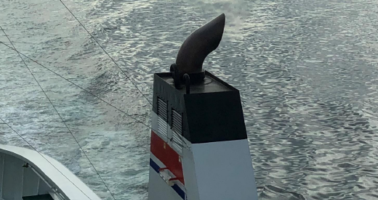April 15, 2021
The consulting firm Sphera (formerly thinkstep) updates its report on emissions from ships powered by LNG. The study confirms the advantages of LNG as a marine fuel in reducing polluting emissions and concludes that it can contribute "without a doubt" to the GHG reduction objectives of the International Maritime Organization (IMO).
The study, commissioned by industry coalitions SEA-LNG and SGMF, was conducted in accordance with ISO standards. In addition, it was reviewed again by a group of leading independent academic experts from key institutions in France, Germany, Japan and the United States. The summary of the study keys is available from SEA / LNG at: 2021_Sphera_Study_Key_Findings_Document.pdf (sea-lng.org), the complete study is available on the Sphera website: 2nd Lifecycle GHG Emission Study on the use of LNG as a Marine Fuel
"Sphera's updated study ensures that the sector has access to comprehensive and fully up-to-date research. It is clear that LNG plays an important role in today's decarbonisation, with benefits available now. Looking ahead, it is essential that "Detailed analyzes of emissions from the Well to the Wake, such as those carried out for LNG, for all the alternative fuels contemplated, which will allow shipowners to make the correct decisions for their fleet"
Peter Keller, President of SEA-LNG,
This comprehensive report uses the latest raw data to assess the world's major marine engine types and supply sources, with quality data provided by original equipment manufacturers such as Caterpillar MaK, Caterpillar Solar Turbines, GE, MAN Energy Solutions, Rolls Royce (MTU), Wärtsilä and Winterthur Gas & Diesel, as well as by ExxonMobil, Shell and Total on the supply side. Methane emissions from supply chains, as well as methane released during the on-board combustion process (methane slip), have been included in the analysis.
The study addresses one of the most controversial issues regarding LNG emissions, the so-called problem of 'methane slip' confirming reductions of up to 50% in low pressure two-stroke engines.

"Methane slippage, often based on outdated data, has become an overused argument by those wishing to justify inaction. Sphera's study underscores the progress made to counter this concern. Its analysis provides independent confirmation that, By 2030, methane slippage will have been virtually eliminated as technological improvements continue. The facts consistently confirm that there is no other alternative deepwater fuel in the short and medium term than LNG.
LNG remains the clear starting point for a carbon-neutral future for shipping, especially as the way forward includes biological and synthetic products. Waiting is not an option. "The sector must act now to take advantage of the benefits that can clearly be obtained from the use of LNG."
Peter Keller, President of SEA-LNG,
It is important to note that the study also reaffirms that the use of LNG as a marine fuel has important benefits for air quality, with local emissions, such as sulfur oxides (SOx), nitrogen oxides (NOx) and particulates (PM ), all of them close to zero.
"It is important that the sector has the best information to make often complex decisions between fuels. This study provides reliable, high-quality data on LNG emissions.
We are confident that this work will provide IMO with robust information to inform its policy decisions. The SGMF will continue to provide updated data not only for LNG, but for all candidate gaseous fuels within its purview, including ammonia and hydrogen.
Today, the clear option for an immediate and significant reduction in emissions is LNG, which is widely available and fully complies with current regulations. This is reflected in the rapid increase in LNG adoption in the offshore container, bulk and tanker sectors, a trend we expect to accelerate even as more horizon-challenging fuels enter the market. mix safely and sustainably."
Samir Bailouni, President of the Society for Gas as Marine Fuel (SGMF):

